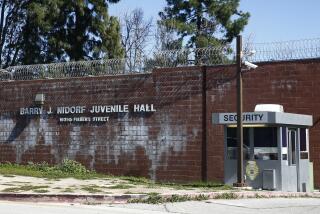Public Defender System Falls Short of Savings Goal, Study Says
- Share via
San Diego County’s year-old experiment with using salaried public defenders to represent indigents in many serious felony cases has not registered all the savings promised, according to a study released this week by county analysts.
But the staff lawyers do cost the county less than private attorneys doing comparable work on a contract basis, the study says, while providing equal or better representation to the poor.
It recommends increasing the county’s reliance on public defenders and exploring the creation of a second public defender’s office to handle cases that pose conflicts of interest for the existing office.
The report by analysts in the county’s Chief Administrative Office is likely to fuel a growing debate over the future of the county’s indigent defense system, the budget for which has multiplied dramatically in the past decade despite the Board of Supervisors’ efforts to hold down costs.
A recent county budget review estimated the Office of Defender Services (ODS) would outspend its $10.9 million budget for the 1985-1986 fiscal year by more than $1.8 million. In 1975-1976, the county’s cost for indigent defense was about $3.4 million.
Meanwhile, the county is facing a barrage of charges that its efforts to rein in the escalating costs have denied indigents an adequate defense.
The county is trying to settle a lawsuit alleging that its system of contracting with private lawyers to handle misdemeanor and lesser felony cases--started in 1978 to limit defense costs--so tightly restricts spending on an indigent’s defense that it is unconstitutional. The American Bar Assn. and other national legal groups have castigated the contract system as well.
In that context, a blue-ribbon commission of civic leaders is considering whether to recommend that supervisors abandon the contract system and substitute a full-scale public defender office or some other alternative to provide defense services for the poor.
The new report seems to offer ammunition to both supporters and foes of expanding the existing, 21-lawyer public defender office, established in late 1984. Public defenders currently represent about 70% of indigents accused of serious felonies, including murder, rape, kidnaping, sexually attacks on children and assault with deadly weapons.
Based on a review of more than 500 serious felony cases filed between December, 1984, and March, 1985, the study says public defenders on average cost 16% less than private attorneys appointed under contracts with the county.
However, nearly all the savings were in the most serious cases handled by public defenders, according to the study. In the somewhat less heinous crimes that make up the bulk of cases categorized as serious felonies, the costs of using public defenders and private lawyers were virtually the same.
That finding surprised private defense lawyers, who recalled that the public defender program was advertised as a way of cutting costs in those high-volume cases.
“Those were supposed to be the ones where there was the most waste,” said Vista lawyer Diane Campbell, chairman of the county’s Indigent Defense Advisory Board.
Yet ODS director Melvin Nitz, who strongly advocates expanding the public defender program, said the promised savings will materialize the longer the program operates.
“I don’t think the public defender system had the opportunity to work enough of those cases to show it was cost efficient or cost effective,” he said.
According to Nitz, the so-called “limited public defender office” saved the county about $800,000 to $900,000 in its first year of operation, rather than the $1.3 million he predicted in urging the Board of Supervisors to start the defender program.
In part, the higher-than-expected cost of public defenders reflected the fact that they made use of investigators and experts to bolster defendants’ cases more often than did private attorneys, the study found.
The greater use of specialists, however, was one reason the report concluded that public defenders “demonstrated an equal or higher level of representation” of indigents than private, appointed lawyers.
Other findings of the study included:
- The county could save more by reducing the number of serious felonies handled by private lawyers and increasing the share handled by public defenders.
- Appointed lawyers are more likely to take the most serious felony cases to trial than are public defenders, who settle those cases earlier. Lawyers retained and paid by clients resolve cases the quickest of all.
- Public defenders file pre-sentence reports, arguing for lighter punishments for their clients, in three out of four cases they handle. Appointed attorneys file such reports in only two out of each four cases. The study says such advocacy is an important measure of the effectiveness of defense services.
More to Read
Sign up for Essential California
The most important California stories and recommendations in your inbox every morning.
You may occasionally receive promotional content from the Los Angeles Times.













